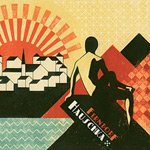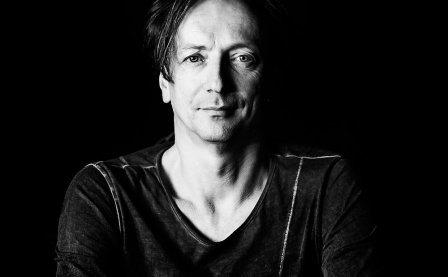Last year, Karaoke Kalk released a remix album of Hauschka’s works that underscored the quirky versatility of the prepared piano, an instrument that can author glitchy percussive tricks while skating atop crystalline lines of melody at the same time. Bertmann’s use of the instrument is closer to that of John Cage, who wrote sonatas for it in the 1940s, than that of Anthony Pateras, whose dense avant-garde explorations of it conjure Charlemagne Palestine and his maximalist/minimalist contemporaries. In fact, for a few songs on this disc, you wouldn’t even know that the piano being played was not a traditional hammers-and-string Steinway. The occasional buzz and crackle zip through the fat cushions of orchestral accompaniment, but Ferndorf is otherwise a straight-up, albeit lovely, classical album.
Bertmann claims the album is a reflection upon the natural landscapes of his childhood, which places this work, weirdly enough, in line with compatriot Wolfgang Voigt’s Gas box set from earlier this year and, less directly, with Jan Jelinek’s Tierbeobachtungen of 2006. Voigt, the techno impresario at the helm of Kompakt records, has remarked on the drugged pastoral leitmotif of his work as Gas; Ferndorf traffics in a similarly nostalgic, back-to-nature economy. The thematic relation between the records is clear enough. Musically, however, they are quite distinct. Voigt’s techno meditations contrast starkly with Hauschka’s urgent, twinkling reaches into the past. “Freibad” encapsulates this aesthetic with somber peals of horn, lusty strings, and the plinks, plunks, and clangs of the piano. “Barfuss Durch Gras” is the prelude to a rainstorm, its curiously mangled tones drizzling down in stop-motion polyrhythm. “Heimat” begins almost too sweetly before a clever swoop into cut-time that evokes Gonzales’ gymnopedic etudes. “Eltern” maps the most complex emotional turf of the record thanks to the nuanced production; it’s a hydraulic elegy for innocence, spitting, cooing, and sighing its way to a disconsolate finish.
On Ferndorf, Bertmann casts within several eras of classical composition, darting up briefly into contemporary experimentation, like a kid on a playground sprinting and laughing, then pausing to scrutinize a fallen leaf or a dragonfly. It’s his intensity of focus coupled with an impressive range of motion that gives this album its real strength and maturity. These qualities enable him to thoughtfully explore two themes – childhood and nature – that are all too often saturated in sentimentality when affixed within the artist’s lens.
More about: Hauschka




